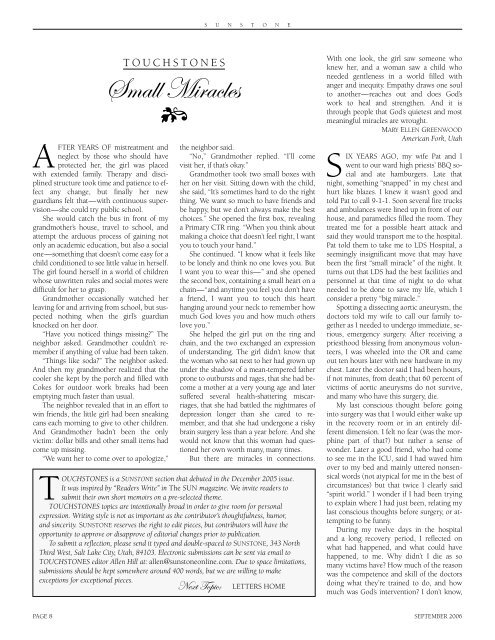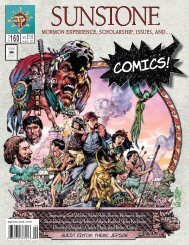00a_cover cmyk dark blue.qxp - Sunstone Magazine
00a_cover cmyk dark blue.qxp - Sunstone Magazine
00a_cover cmyk dark blue.qxp - Sunstone Magazine
Create successful ePaper yourself
Turn your PDF publications into a flip-book with our unique Google optimized e-Paper software.
S U N S T O N E<br />
AFTER YEARS OF mistreatment and<br />
neglect by those who should have<br />
protected her, the girl was placed<br />
with extended family. Therapy and disciplined<br />
structure took time and patience to effect<br />
any change, but finally her new<br />
guardians felt that—with continuous supervision—she<br />
could try public school.<br />
She would catch the bus in front of my<br />
grandmother’s house, travel to school, and<br />
attempt the arduous process of gaining not<br />
only an academic education, but also a social<br />
one—something that doesn’t come easy for a<br />
child conditioned to see little value in herself.<br />
The girl found herself in a world of children<br />
whose unwritten rules and social mores were<br />
difficult for her to grasp.<br />
Grandmother occasionally watched her<br />
leaving for and arriving from school, but suspected<br />
nothing when the girl’s guardian<br />
knocked on her door.<br />
“Have you noticed things missing?” The<br />
neighbor asked. Grandmother couldn’t remember<br />
if anything of value had been taken.<br />
“Things like soda?” The neighbor asked.<br />
And then my grandmother realized that the<br />
cooler she kept by the porch and filled with<br />
Cokes for outdoor work breaks had been<br />
emptying much faster than usual.<br />
The neighbor revealed that in an effort to<br />
win friends, the little girl had been sneaking<br />
cans each morning to give to other children.<br />
And Grandmother hadn’t been the only<br />
victim: dollar bills and other small items had<br />
come up missing.<br />
“We want her to come over to apologize,”<br />
TOUCHSTONES<br />
Small Miracles<br />
<br />
the neighbor said.<br />
“No,” Grandmother replied. “I’ll come<br />
visit her, if that’s okay.”<br />
Grandmother took two small boxes with<br />
her on her visit. Sitting down with the child,<br />
she said, “It’s sometimes hard to do the right<br />
thing. We want so much to have friends and<br />
be happy, but we don’t always make the best<br />
choices.” She opened the first box, revealing<br />
a Primary CTR ring. “When you think about<br />
making a choice that doesn’t feel right, I want<br />
you to touch your hand.”<br />
She continued. “I know what it feels like<br />
to be lonely and think no one loves you. But<br />
I want you to wear this—” and she opened<br />
the second box, containing a small heart on a<br />
chain—“and anytime you feel you don’t have<br />
a friend, I want you to touch this heart<br />
hanging around your neck to remember how<br />
much God loves you and how much others<br />
love you.”<br />
She helped the girl put on the ring and<br />
chain, and the two exchanged an expression<br />
of understanding. The girl didn’t know that<br />
the woman who sat next to her had grown up<br />
under the shadow of a mean-tempered father<br />
prone to outbursts and rages, that she had become<br />
a mother at a very young age and later<br />
suffered several health-shattering miscarriages,<br />
that she had battled the nightmares of<br />
depression longer than she cared to remember,<br />
and that she had undergone a risky<br />
brain surgery less than a year before. And she<br />
would not know that this woman had questioned<br />
her own worth many, many times.<br />
But there are miracles in connections.<br />
TOUCHSTONES is a SUNSTONE section that debuted in the December 2005 issue.<br />
It was inspired by “Readers Write” in The SUN magazine. We invite readers to<br />
submit their own short memoirs on a pre-selected theme.<br />
TOUCHSTONES topics are intentionally broad in order to give room for personal<br />
expression. Writing style is not as important as the contributor’s thoughtfulness, humor,<br />
and sincerity. SUNSTONE reserves the right to edit pieces, but contributors will have the<br />
opportunity to approve or disapprove of editorial changes prior to publication.<br />
To submit a reflection, please send it typed and double-spaced to SUNSTONE, 343 North<br />
Third West, Salt Lake City, Utah, 84103. Electronic submissions can be sent via email to<br />
TOUCHSTONES editor Allen Hill at: allen@sunstoneonline.com. Due to space limitations,<br />
submissions should be kept somewhere around 400 words, but we are willing to make<br />
exceptions for exceptional pieces.<br />
LETTERS HOME<br />
Next Topic:<br />
With one look, the girl saw someone who<br />
knew her, and a woman saw a child who<br />
needed gentleness in a world filled with<br />
anger and inequity. Empathy draws one soul<br />
to another—reaches out and does God’s<br />
work to heal and strengthen. And it is<br />
through people that God’s quietest and most<br />
meaningful miracles are wrought.<br />
MARY ELLEN GREENWOOD<br />
American Fork, Utah<br />
SIX YEARS AGO, my wife Pat and I<br />
went to our ward high priests’ BBQ social<br />
and ate hamburgers. Late that<br />
night, something “snapped” in my chest and<br />
hurt like blazes. I knew it wasn’t good and<br />
told Pat to call 9-1-1. Soon several fire trucks<br />
and ambulances were lined up in front of our<br />
house, and paramedics filled the room. They<br />
treated me for a possible heart attack and<br />
said they would transport me to the hospital.<br />
Pat told them to take me to LDS Hospital, a<br />
seemingly insignificant move that may have<br />
been the first “small miracle” of the night. It<br />
turns out that LDS had the best facilities and<br />
personnel at that time of night to do what<br />
needed to be done to save my life, which I<br />
consider a pretty “big miracle.”<br />
Spotting a dissecting aortic aneurysm, the<br />
doctors told my wife to call our family together<br />
as I needed to undergo immediate, serious,<br />
emergency surgery. After receiving a<br />
priesthood blessing from anonymous volunteers,<br />
I was wheeled into the OR and came<br />
out ten hours later with new hardware in my<br />
chest. Later the doctor said I had been hours,<br />
if not minutes, from death; that 60 percent of<br />
victims of aortic aneurysms do not survive,<br />
and many who have this surgery, die.<br />
My last conscious thought before going<br />
into surgery was that I would either wake up<br />
in the re<strong>cover</strong>y room or in an entirely different<br />
dimension. I felt no fear (was the morphine<br />
part of that?) but rather a sense of<br />
wonder. Later a good friend, who had come<br />
to see me in the ICU, said I had waved him<br />
over to my bed and mainly uttered nonsensical<br />
words (not atypical for me in the best of<br />
circumstances) but that twice I clearly said<br />
“spirit world.” I wonder if I had been trying<br />
to explain where I had just been, relating my<br />
last conscious thoughts before surgery, or attempting<br />
to be funny.<br />
During my twelve days in the hospital<br />
and a long re<strong>cover</strong>y period, I reflected on<br />
what had happened, and what could have<br />
happened, to me. Why didn’t I die as so<br />
many victims have? How much of the reason<br />
was the competence and skill of the doctors<br />
doing what they’re trained to do, and how<br />
much was God’s intervention? I don’t know,<br />
PAGE 8 SEPTEMBER 2006

















